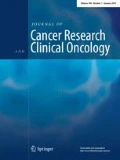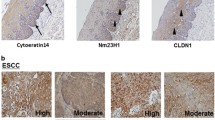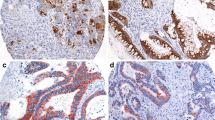Abstract
Purpose
Bile acids might induce mucin expression and regulate tumor behavior in esophageal and colon cancers. However, little is known about the effect of bile acids on tumor invasiveness of gastric carcinoma (GC). The aim of the current study was to elucidate the mechanisms by which bile acids regulate tumor invasion in GC.
Methods
We investigated bile acid-induced MUC2 expression and cell invasion and migration in the cultured GC cell lines, SNU-216, and MKN45. In addition, immunohistochemical analysis of MUC2 and Snail was performed on 389 archival paraffin-embedded tissues of GC to evaluate the correlation of their expression with prognosis.
Results
Deoxycholic acid (DCA), a secondary bile acid, had no effect on the viability of SNU-216 and MKN45 GC cells at low concentrations (0–100 μM), but decreased viability at a higher concentration (200 μM). MKN45 cells showed higher MUC2 expression than SNU-216 cells under basal conditions. DCA treatment upregulated MUC2 mRNA expression in both SNU-216 and MKN45 cells. Expression of Snail and MMP9 was markedly decreased by DCA treatment, and E-cadherin expression was subsequently increased. DCA significantly inhibited invasion and migration of SNU-216 and MKN45 cells. In human GC, MUC2 expression showed a negative correlation with Snail expression (P = 0.021) and a significantly positive correlation with better prognosis (P = 0.023).
Conclusions
Taken together, our data suggest that DCA induced MUC2 expression in GC cells and inhibited tumor invasion and migration. Additionally, MUC2-expressing GCs showed low rates of Snail expression and were associated with a favorable prognosis.






Similar content being viewed by others
Abbreviations
- GC:
-
Gastric carcinoma
- DCA:
-
Deoxycholic acid
- FBS:
-
Fetal bovine serum
- SDS:
-
Sodium dodecyl sulfate
- SQ RT-PCR:
-
Semiquantitative reverse transcription–polymerase chain reaction
- MMP9:
-
Matrix metalloproteinase 9
- EMT:
-
Epithelial-mesenchymal transition
References
Akyürek N, Akyol G, Dursun A, Yamaç D, Günel N (2002) Expression of MUC1 and MUC2 mucins in gastric carcinomas: their relationship with clinicopathologic parameters and prognosis. Pathol Res Pract 198:665–674
Albarello L, Pecciarini L, Doglioni C (2011) HER2 testing in gastric cancer. Adv Anat Pathol 18:53–59
Audie JP, Janin A, Porchet N, Copin MC, Gosselin B, Aubert JP (1993) Expression of human mucin genes in respiratory, digestive, and reproductive tracts ascertained by in situ hybridization. J Histochem Cytochem 41:1479–1485
Baldus SE, Zirbes TK, Engel S, Hanisch FG, Mönig SP, Lorenzen J, Glossmann J, Fromm S, Thiele J, Pichlmaier H, Dienes HP (1998) Correlation of the immunohistochemical reactivity of mucin peptide cores MUC1 and MUC2 with the histopathological subtype and prognosis of gastric carcinomas. Int J Cancer 79:133–138
Chang SK, Dohrman AF, Basbaum CB, Ho SB, Tsuda T, Toribara NW, Gum JR, Kim YS (1994) Localization of mucin (MUC2 and MUC3) messenger RNA and peptide expression in human normal intestine and colon cancer. Gastroenterology 107:28–36
Chen KH, Mukaisho K, Sugihara H, Araki Y, Yamamoto G, Hattori T (2007) High animal-fat intake changes the bile-acid composition of bile juice and enhances the development of Barrett’s esophagus and esophageal adenocarcinoma in a rat duodenal-contents reflux model. Cancer Sci 98:1683–1688
Cronin J, Williams L, McAdam E, Eltahir Z, Griffiths P, Baxter J, Jenkins G (2010) The role of secondary bile acids in neoplastic development in the oesophagus. Biochem Soc Trans 38:337–342
De Vita F, Giuliani F, Silvestris N, Catalano G (2010) Human epidermal growth factor receptor 2 (HER2) in gastric cancer: a new therapeutic target. Cancer Treat Rev 36:S11–S15
Goldner FH, Boyce HW Jr (1976) Relationship of bile in the stomach to gastritis. Gastrointest Endosc 22:197–199
Gong L, Debruyne PR, Witek M, Nielsen K, Snook A, Lin JE, Bombonati A, Palazzo J, Schulz S, Waldman SA (2009) Bile acids initiate lineage-addicted gastroesophageal tumorigenesis by suppressing the EGF receptor-AKT axis. Clin Transl Sci 2:286–293
Ilhan O, Han U, Onal B, Celik SY (2010) Prognostic significance of MUC1, MUC2 and MUC5AC expressions in gastric carcinoma. Turk J Gastroenterol 21:345–352
Jenkins GJ, Cronin J, Alhamdani A, Rawat N, D’Souza F, Thomas T, Eltahir Z, Griffiths AP, Baxter JN (2008) The bile acid deoxycholic acid has a non-linear dose response for DNA damage and possibly NF-kappaB activation in oesophageal cells, with a mechanism of action involving ROS. Mutagenesis 23:399–405
Jørgensen JT (2010) Targeted HER2 treatment in advanced gastric cancer. Oncology 78:26–33
Kamangar F, Dores GM, Anderson WF (2006) Patterns of cancer incidence, mortality, and prevalence across five continents: defining priorities to reduce cancer disparities in different geographic regions of the world. J Clin Oncol 24:2137–2150
Kang H, Min BS, Lee KY, Kim NK, Kim SN, Choi J, Kim H (2010) Loss of E-cadherin and MUC2 expressions correlated with poor survival in patients with stages II and III colorectal carcinoma. Ann Surg Oncol 18:711–719
Kazumori H, Ishihara S, Rumi MAK, Kadowaki Y, Kinoshita Y (2006) Bile acids directly augment caudal related homeobox gene Cdx2 expression in oesophageal keratinocytes in Barrett’s epithelium. Gut 55:16–25
Kim WH, Schnaper HW, Nomizu M, Yamada Y, Kleinman HK (1994) Apoptosis in human fibrosarcoma cells is induced by a multimeric synthetic Tyr-Ile-Gly-Ser-Arg (YIGSR) containing polypeptide from laminin. Cancer Res 54:5005–5010
Kocer B, Soran A, Kiyak G, Erdogan S, Eroglu A, Bozkurt B, Solak C, Cengiz O (2004) Prognostic significance of mucin expression in gastric carcinoma. Dig Dis Sci 49:954–964
Lee HW, Yang DH, Kim HK, Lee BH, Choi KC, Choi YH, Park YE (2007) Expression of MUC2 in gastric carcinomas and background mucosae. J Gastroenterol Hepatol 22:1336–1343
Lee KH, Lee HE, Cho SJ, Cho YJ, Lee HS, Kim JH, Nam SY, Chang MS, Kim WH, Lee BL (2008) Immunohistochemical analysis of cell cycle-related molecules in gastric carcinoma: prognostic significance, correlation with clinicopathological parameters, proliferation and apoptosis. Pathobiology 75:364–372
Lee OJ, Kim HJ, Kim JR, Watanabe H (2009) The prognostic significance of the mucin phenotype of gastric adenocarcinoma and its relationship with histologic classifications. Oncol Rep 21:387–393
Leteurtre E, Zerimech F, Piessen G, Wacrenier A, Leroy X, Copin MC, Mariette C, Aubert JP, Porchet N, Buisine MP (2006) Relationships between mucinous gastric carcinoma, MUC2 expression and survival. World J Gastroenterol 12:3324–3331
Pinto-de-Sousa J, David L, Reis CA, Gomes R, Silva L, Pimenta A (2002) Mucins MUC1, MUC2, MUC5AC and MUC6 expression in the evaluation of differentiation and clinico-biological behaviour of gastric carcinoma. Virchows Arch 440:304–310
Pyo JS, Ko YS, Kim WH, Kim M, Lee KW, Nam SY, Chung HY, Cho SJ, Baik TK, Lee BL (2010) Impairment of nuclear factor-kappaB activation increased glutamate excitotoxicity in a motoneuron-neuroblastoma hybrid cell line expressing mutant (G93A) Cu/Zn-superoxide dismutase. J Neurosci Res 88:2494–2503
Redlak MJ, Miller TA (2011) Targeting PI3K/Akt/HSP90 signaling sensitizes gastric cancer cells to deoxycholate-induced apoptosis. Dig Dis Sci 56:323–329
Redlak MJ, Power JJ, Miller TA (2008) Prevention of deoxycholate-induced gastric apoptosis by aspirin: roles of NF-kappaB and PKC signaling. J Surg Res 145:66–73
Roessler K, Mönig SP, Schneider PM, Hanisch FG, Landsberg S, Thiele J, Hölscher AH, Dienes HP, Baldus SE (2005) Co-expression of CDX2 and MUC2 in gastric carcinomas: correlations with clinico-pathological parameters and prognosis. World J Gastroenterol 11:3182–3188
Roman S, Pétré A, Thépot A, Hautefeuille A, Scoazec JY, Mion F, Hainaut P (2007) Downregulation of p63 upon exposure to bile salts and acid in normal and cancer esophageal cells in culture. Am J Physiol Gastrointest Liver Physiol 293:G45–G53
Shin NR, Jeong EH, Choi CI, Moon HJ, Kwon CH, Chu IS, Kim GH, Jeon TY, Kim DH, Lee JH, Park DY (2012) Overexpression of Snail is associated with lymph node metastasis and poor prognosis in patients with gastric cancer. BMC Cancer 12:521–535
Silva EM, Begnami MD, Fregnani JH, Pelosof AG, Zitron C, Montagnini AL, Soares FA (2008) Cadherin-catenin adhesion system and mucin expression: a comparison between young and older patients with gastric carcinoma. Gastric Cancer 11:149–159
Song W, Yang HB, Chen P, Wang SM, Zhao LP, Xu WH, Fan HF, Gu X, Chen LY (2013) Apoptosis of human gastric carcinoma SGC-7901 induced by deoxycholic acid via the mitochondrial-dependent pathway. Appl Biochem Biotechnol 171:1061–1071
Tajima Y, Shimoda T, Nakanishi Y, Yokoyama N, Tanaka T, Shimizu K, Saito T, Kawamura M, Kusano M, Kumagai K (2001) Gastric and intestinal phenotypic marker expression in gastric carcinomas and its prognostic significance: immunohistochemical analysis of 136 lesions. Oncology 61:212–220
Tajima Y, Yamazaki K, Nishino N, Morohara K, Yamazaki T, Kaetsu T, Suzuki S, Kawamura M, Kumagai K, Kusano M (2004) Gastric and intestinal phenotypic marker expression in gastric carcinomas and recurrence pattern after surgery-immunohistochemical analysis of 213 lesions. Br J Cancer 91:1342–1348
Tatsugami M, Ito M, Tanaka S, Yoshihara M, Matsui H, Haruma K, Chayama K (2012) Bile acid promotes intestinal metaplasia and gastric carcinogenesis. Cancer Epidemiol Biomarkers Prev 21:2101–2107
Utsunomiya T, Yonezawa S, Sakamoto H, Kitamura H, Hokita S, Aiko T, Tanaka S, Irimura T, Kim YS, Sato E (1998) Expression of MUC1 and MUC2 mucins in gastric carcinomas: its relationship with the prognosis of the patients. Clin Cancer Res 4:2605–2614
Wakatsuki K, Yamada Y, Narikiyo M, Ueno M, Takayama T, Tamaki H, Miki K, Matsumoto S, Enomoto K, Yokotani T, Nakajima Y (2008) Clinicopathological and prognostic significance of mucin phenotype in gastric cancer. J Surg Oncol 98:124–129
Wu J, Gong J, Geng J, Song Y (2008) Deoxycholic acid induces the overexpression of intestinal mucin, MUC2, via NF-kB signaling pathway in human esophageal adenocarcinoma cells. BMC Cancer 8:333–343
Xiao LJ, Zhao S, Zhao EH, Zheng X, Gou WF, Xing YN, Takano Y, Zheng HC (2012) Clinicopathological and prognostic significance of MUC-2, MUC-4 and MUC-5AC expression in japanese gastric carcinomas. Asian Pac J Cancer Prev 13:6447–6453
Yen CJ, Izzo JG, Lee DF, Guha S, Wei Y, Wu TT, Chen CT, Kuo HP, Hsu JM, Sun HL, Chou CK, Buttar NS, Wang KK, Huang P, Ajani J, Hung MC (2008) Bile acid exposure up-regulates tuberous sclerosis complex 1/mammalian target of rapamycin pathway in Barrett’s-associated esophageal adenocarcinoma. Cancer Res 68:2632–2640
Yonezawa S, Goto M, Yamada N, Higashi M, Nomoto M (2008) Expression profiles of MUC1, MUC2, and MUC4 mucins in human neoplasms and their relationship with biological behavior. Proteomics 8:3329–3341
Yoshikawa A, Inada Ki K, Yamachika T, Shimizu N, Kaminishi M, Tatematsu M (1998) Phenotypic shift in human differentiated gastric cancers from gastric to intestinal epithelial cell type during disease progression. Gastric Cancer 1:134–141
Acknowledgments
This study was supported by the Sungkyunkwan University Foundation for Corporate Collaboration.
Conflict of interest
The authors declare that there are no conflicts of interest or financial disclosures.
Author information
Authors and Affiliations
Corresponding authors
Rights and permissions
About this article
Cite this article
Pyo, JS., Ko, Y.S., Kang, G. et al. Bile acid induces MUC2 expression and inhibits tumor invasion in gastric carcinomas. J Cancer Res Clin Oncol 141, 1181–1188 (2015). https://doi.org/10.1007/s00432-014-1890-1
Received:
Accepted:
Published:
Issue Date:
DOI: https://doi.org/10.1007/s00432-014-1890-1




